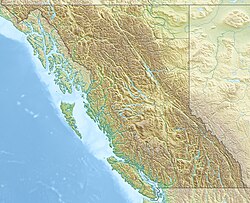| Scarp Mountain | |
|---|---|
| Highest point | |
| Elevation | 3,000 m (9,800 ft) [1] [2] |
| Prominence | 317 m (1,040 ft) [3] |
| Parent peak | Mount Fraser (3313 m) [3] |
| Listing | |
| Coordinates | 52°37′59″N118°21′21″W / 52.63306°N 118.35583°W [4] |
| Geography | |
| Country | Canada |
| Provinces | Alberta and British Columbia |
| Protected areas | |
| Parent range | Park Ranges |
| Topo map | NTS 83D9 Amethyst Lakes [4] |
| Climbing | |
| First ascent | 1933 Rex Gibson, E.R. Woolf [1] [3] |
Scarp Mountain is located on the border of Alberta and British Columbia, at the southern end of Mount Robson Provincial Park. [5] It was named in 1922 by Arthur O. Wheeler. [1] [3]


